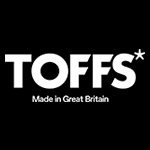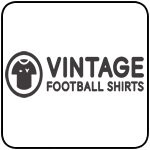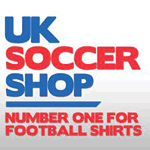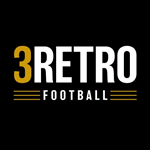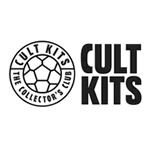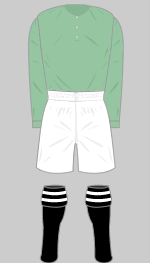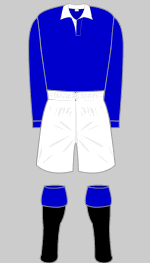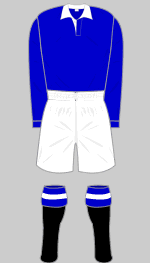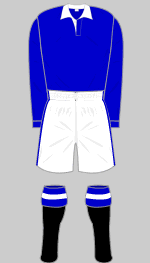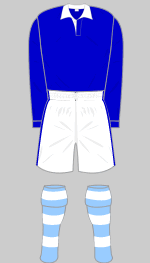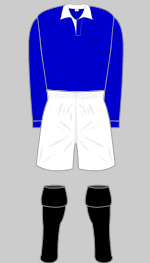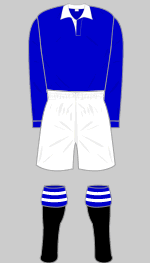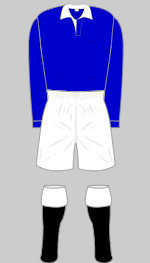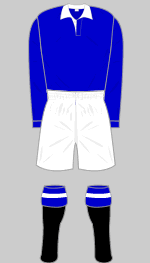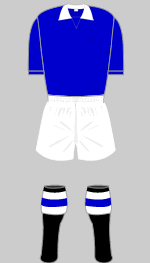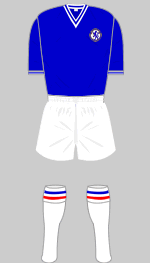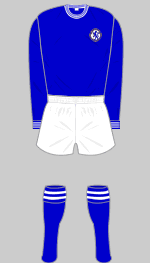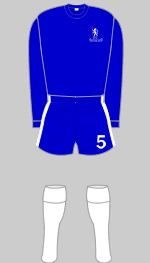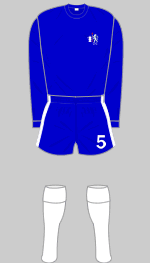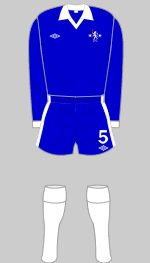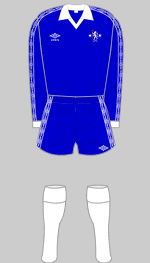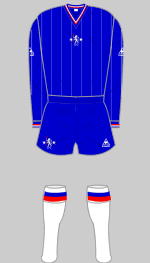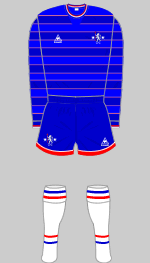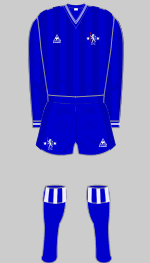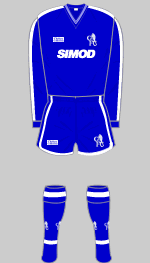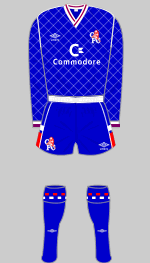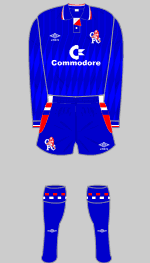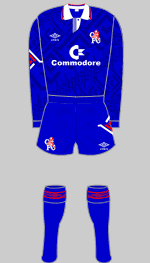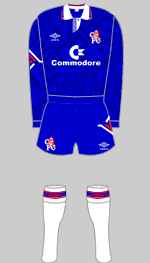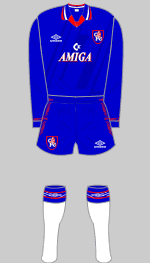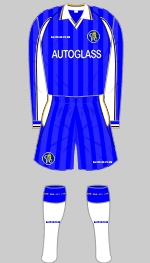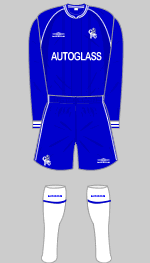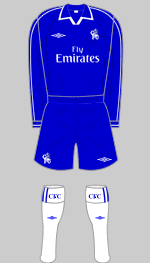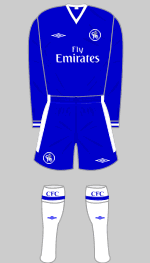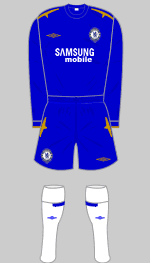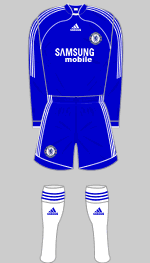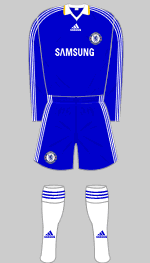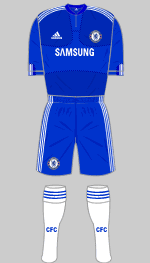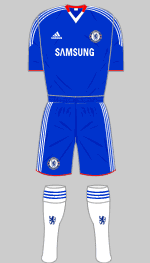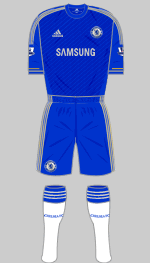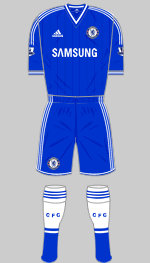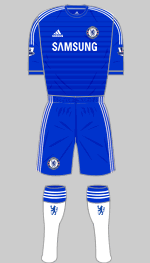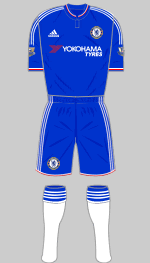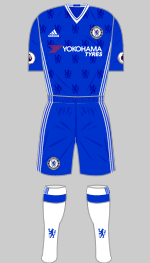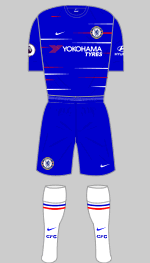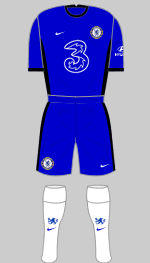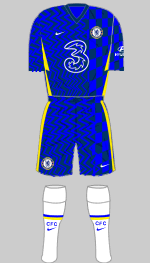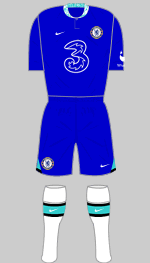Kit History
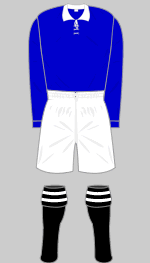
6 Oct 1906-1911 n x G
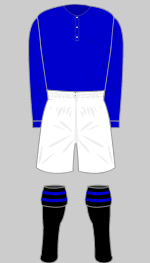
1911-1912 v n x
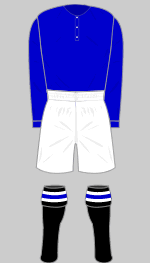
1912-1914 v x
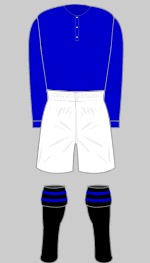
1914-1918 v D
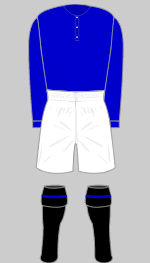
1919-1921 x
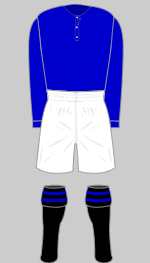
1924-1925 v
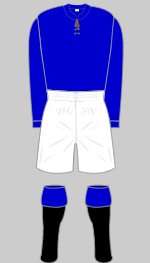
1925-1929 m o v x z
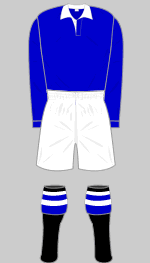
1949-1955 a f h o v x
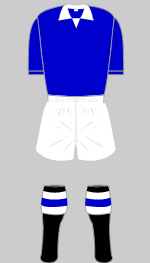
1955-1957 h o s
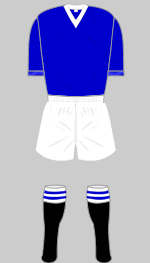
1957-1958 h
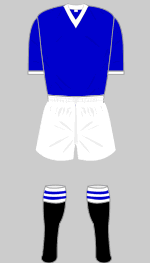
1958-1959 o
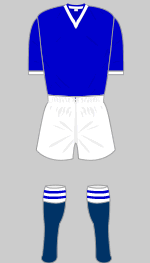
1959-1960 h p x
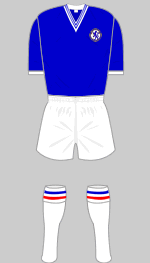
Aug 60-Sept 61 c h x
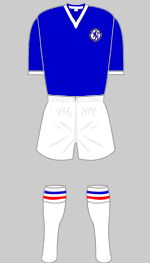
29 April 1961 x
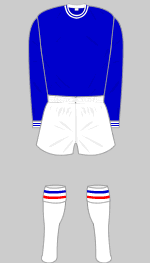
Dec 61-May 1962 v x
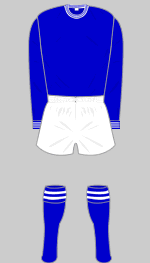
1963-1964 v
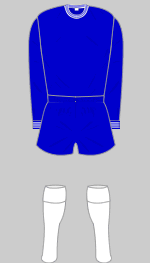
4 March 1964 x
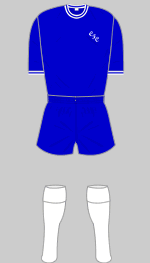
22 August 1964 x
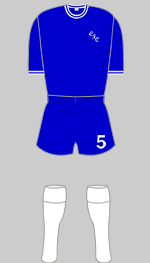
29 August 1964 h v x
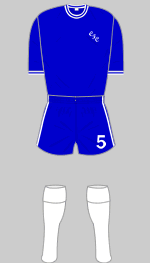
30 Sept 1964 x
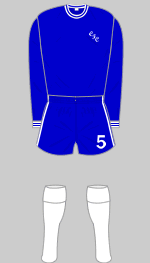
Nov 64-17 Nov 65 x
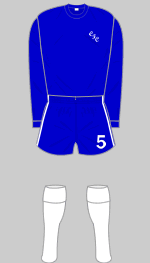
1 Dec 65-1967 d f h x
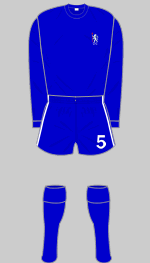
1967-1968 m x
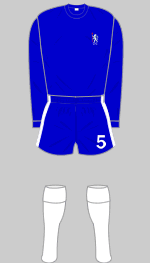
1968-1970 d f h
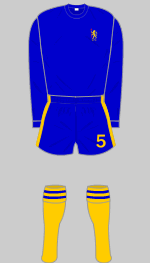
70 FA Cup Replay x

1970-May 71 alt x
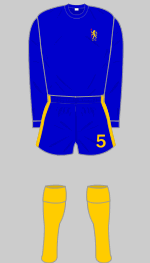
May 1971-Jan 72 x
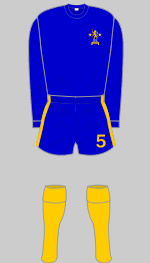
May 1972-Jan 1973 l Worn against teams in white socks
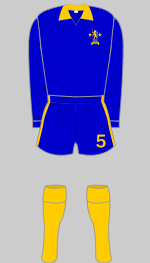
1972 alt x
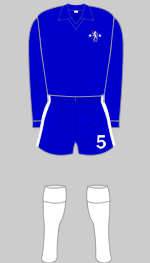
Nov 1972-1973 h r st
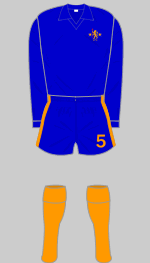
Feb 1973 alt x y
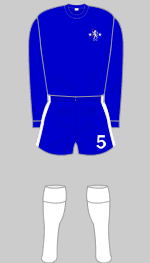
1973-1975 s t
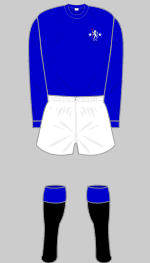
27 Jan 74 F
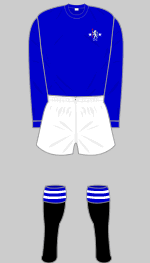
1973-1975 alt x
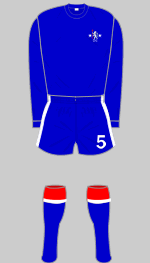
1974-1975 alt x
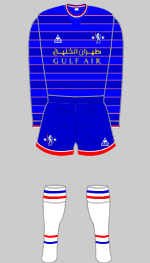
1983-1984 d x
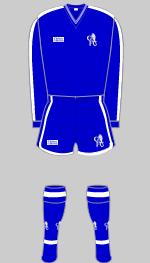
Aug -Dec 1986 d j k x
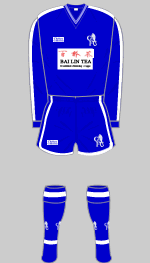
Jan-1987 x

Jan-Feb 1987 x
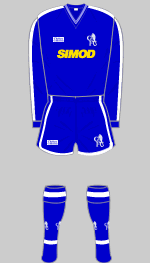
Feb-1987 E
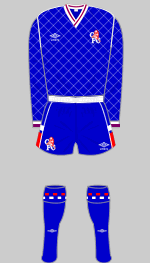
Aug-Sept 1987 x
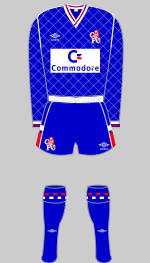
Sept-Oct 1987 d l q x
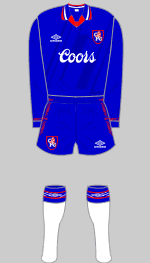
1994-1995 d l
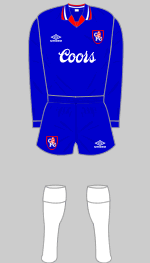
1994-1995 x C
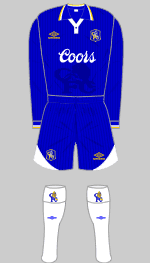
1995-1997 d
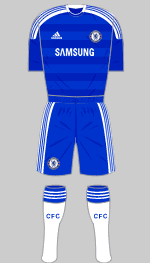
2011-2012 c
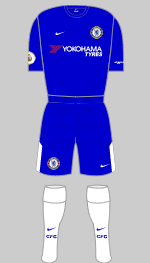
2017-2018 c
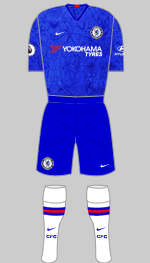
2019-2020 c
Background
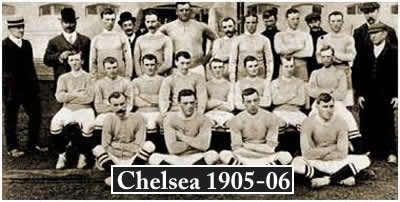 Chelsea joined the League before
they had played a single game - an achievement they share with Bradford
City. The club came into being at the behest of a builder, Gus Mears and
his brother who aquired the site of the Stamford Bridge Athletic ground
and a neighbouring market garden with a view to building a football stadium.
The plan lay fallow for a while until the Great Western Railway Company
approached the brothers to buy the land for marshalling yards. Rather
than sell their asset, the Mears brothers raised the money they needed
to build the second largest stadium in England after Crystal Palace and
called it Stamford Bridge. When Fulham FC declined an invitation to move
in because the annual £1,500 rent was too high, the brothers simply
went ahead and formed their own club, Chelsea FC. After an approach to join the Southern
League was snubbed following objections from Spurs and Fulham, Chelsea
successfuly applied to join the Second Division of the Football League.
Chelsea joined the League before
they had played a single game - an achievement they share with Bradford
City. The club came into being at the behest of a builder, Gus Mears and
his brother who aquired the site of the Stamford Bridge Athletic ground
and a neighbouring market garden with a view to building a football stadium.
The plan lay fallow for a while until the Great Western Railway Company
approached the brothers to buy the land for marshalling yards. Rather
than sell their asset, the Mears brothers raised the money they needed
to build the second largest stadium in England after Crystal Palace and
called it Stamford Bridge. When Fulham FC declined an invitation to move
in because the annual £1,500 rent was too high, the brothers simply
went ahead and formed their own club, Chelsea FC. After an approach to join the Southern
League was snubbed following objections from Spurs and Fulham, Chelsea
successfuly applied to join the Second Division of the Football League.
Initially, Chelsea played in the racing colours associated with the Earl of Cadogan, who was the club's president and also held the title Viscount Chelsea. Weatherby's Ltd, who maintain historical records of racing silks, have confirmed to HFK that these colours were Eton blue and white. Club historians have suggested several dates for the switch to royal blue but the earliest reference, a match programme found by Nik Yeomans (April 2019) records that Chelsea wore "blue and white" against Lincoln City on 13 October 1906.
The club was nicknamed "The Pensioners"
because of the association with the war 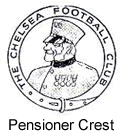 veterans in their famous red uniforms
known as the Chelsea Pensioners, which was reflected in their official crest. This never appeared on the team shirts.
veterans in their famous red uniforms
known as the Chelsea Pensioners, which was reflected in their official crest. This never appeared on the team shirts.
After finishing third in their first
season, Chelsea was promoted to Division One for the first time in 1907,
their second season. They made little impression, however, and spent most
of the Twenties in Division Two. The club flirted with success but never
fulfilled their potential. The club has always enjoyed the patronage of
celebrity supporters because of its fashionable location and proximity
to the West End. Many star players graced the team in the inter-war years
but 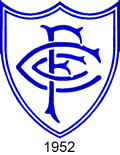 nevertheless, they became a music hall joke with a reputation as the
proverbial "nearly team."
nevertheless, they became a music hall joke with a reputation as the
proverbial "nearly team."
In 1930 a look was established that became the template for the next 25 years, consisting of royal blue shirts with contrasting rugby-style collars, white knickers, black stockings with blue and white turnovers. Hooped socks that appear to be light blue and white were worn in a reds v blues pre-season game in 1934 and again in home matches against Spurs (15 Sept 1934) and Stoke (October) and it is unclear why.
In 1952 Ted
Drake took over as manager and he replaced the pensioner crest with a more 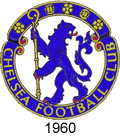 business like monogram on a shield. This badge never appeared on the team's shirts. Drake's workmanlike team broke the mould when Chelsea won the League Championship
for the first time in 1955.
business like monogram on a shield. This badge never appeared on the team's shirts. Drake's workmanlike team broke the mould when Chelsea won the League Championship
for the first time in 1955.
In 1960 Chelsea added a crest to their shirts for the first time. Inspired by the civic coat of arms of the London Borough of Chelsea, it bore a lion rampant derived from the arms of the club's first president, the Earl of Cadogan.
In 1961, Chelsea were relegated to Division Two but
bounced back the following season 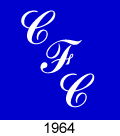 to embark on their most successful period
to date. In March 1964 the team played in blue shorts to match their shirts and white socks. There is evidence that an earlier version was made up in 1962 but rejected as being too radical a
to embark on their most successful period
to date. In March 1964 the team played in blue shorts to match their shirts and white socks. There is evidence that an earlier version was made up in 1962 but rejected as being too radical a 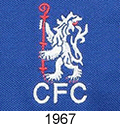 change at the time. Chelsea were, incidentally, the first team to play in Division One with numbers on their shorts.
change at the time. Chelsea were, incidentally, the first team to play in Division One with numbers on their shorts.
The new look evolved gracefully at the start of the 1964-65 season with white trim added incrementally and a new cypher that replaced the old Cadogan crest, which had been retired in 1963.
The lion motif was revived in 1967 and has remained the centre piece of the club crest ever since.
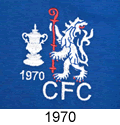 Throughout the Sixties Chelsea rode high in the League and started
to collect cup trophies: the League Cup in 1965 was followed by the FA
Cup (1970) and the European Cup-Winners' Cup (1971). In the 1970-71 season, a small image of the FA Cup was embroidered next to the crest while from the 1971-72 season two stars were added to represent these
Throughout the Sixties Chelsea rode high in the League and started
to collect cup trophies: the League Cup in 1965 was followed by the FA
Cup (1970) and the European Cup-Winners' Cup (1971). In the 1970-71 season, a small image of the FA Cup was embroidered next to the crest while from the 1971-72 season two stars were added to represent these 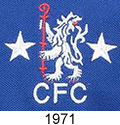 last two famous cup wins.
last two famous cup wins.
Nik Yeomans has discovered that Chelsea wore white shorts and black socks with blue and white turnovers at Stoke, Leeds and West Ham in 1973-74. The same strip was worn the following season in two League Cup ties against Stoke. Further research by Nik has revealed these programme notes from February 1974: The reason we wore white shorts...at Leeds last Saturday was ...a stocking clash! Because Leeds wear white stockings we changed to black (with coloured top) and as it was felt that a strip of blue shirts, blue socks and black stockings would look too dark, we opted for white shorts. Later that season yellow socks were worn when there was a clash.
In 1975 Chelsea were
relegated to Division Two and although they returned four seasons later,
in 1979 they went down again. After languishing in Division Two for five seasons,
Chelsea were promoted as champions in 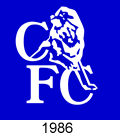 1984. After two promising seasons,
they went down once more but won the Second Division championship the
following season and they have remained in the top flight ever
1984. After two promising seasons,
they went down once more but won the Second Division championship the
following season and they have remained in the top flight ever 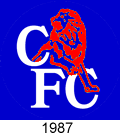 since.
since.
By the mid Eighties the board decided to update their image and a new crest was designed that featured a lion leaping over the letters CFC. This appeared in various forms with the lion rendered in white, red or yellow to match the accent colour for that season.
In 1986-87 Chelsea became the first club to market strips under their own name, the Chelsea Collection. At first these were without a sponsor before Bai Lin Tea, a slimming aid created by Peter Foster briefly appeared in early 1987. The product proved to be bogus and the logo was soon removed: Foster, a career criminal and con artist was arrested and jailed. The shirts were briefly sponsored by Grange Farm, the property of chairman Ken Bates who was fond of telling assembled hacks, "I'm off to my 300 acre farm. You lot can bugger off to your council houses." It appears a logotype was only applied to change shirts. The Italian sportswear company, Simod, took over as sponsor in February 1987. Their logo type appeared in gold for the first game and thereafter was white.
In 1994, Chelsea reached the FA Cup final once again but lost heavily
to Manchester 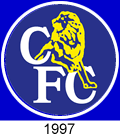 United. Chelsea won the FA Cup in 1997, the League Cup in
1998 and the FA Cup once again in 2000. League performances also improved
as a succession of high profile managers recruited top foreign stars under
the determined and controversial leadership of Ken Bates, who bought the
club earlier in the decade.
United. Chelsea won the FA Cup in 1997, the League Cup in
1998 and the FA Cup once again in 2000. League performances also improved
as a succession of high profile managers recruited top foreign stars under
the determined and controversial leadership of Ken Bates, who bought the
club earlier in the decade.
In 2003, Chelsea's long-standing and controversial chairman, Ken Bates sold the club to Roman Abramovich,
a Russian oligarch reputed to be worth between up to £3.8bn.
While the origins of Abramovich's wealth may be obscure, there was no
doubt about his intentions as over the next few years he poured huge amounts
of cash into the club to enable them to sign some of the world's leading
players. Indeed, at a time when the global transfer market was in recession,
Abramovich's millions bucked the trend, propelling the one time music
hall joke into the elite of European football. After the appointment of
the charismatic Portuguese manager, Jose Mourinho, Chelsea won the first
of back-to-back Premier League titles in 2005, exactly 50 years after
their first 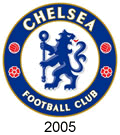 League title, followed by the FA Cup in 2007.
League title, followed by the FA Cup in 2007.
After that first Premier League title, a new crest was designed for the 2005-06 season. Based on the 1960 design it was introduced for the club's centenary. Some minor variations in the arrangment of the colours have appeared such as in 2012-13.
The following September, after persistent stories in the media concerning Mourinho's relationship with Abramovich, the "Special One" departed and his place was taken by Avram Grant, the Director of Football for the Israeli Football Association. In his first season in charge, Grant steered his expensive team (it was reported that Abramovich's investment amounted to around £750 million in interest-free loans) to within an ace of winning a fabulous double. They finished as runners-up to Manchester United after going into the last round of Premier league matches level on points. Ten days later Chelsea and United clashed again in the UEFA Champions League final, United eventually winning on penalties. These results cost Grant his job and he was replaced by Luiz Felipe Scolari. Scolari was himself sacked in the middle of the 2008-09 season and replaced by Guus Hiddink 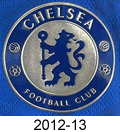 for the remainder of the season.
for the remainder of the season.
Carlo Ancelotti took over at the beginning of the 2009-10 season and took Chelsea to a historic double. Second place in 2011 was not good enough, however, and he too was handed his cards by Mr Abramovich as was his successor, Andre Villas-Boas. It fell to their caretaker manager, Roberto di Matteo, who took over in March 2012, to lead Chelsea to their seventh FA Cup win and an historic UEFA Champions League title, won on penalties in Munich against Bayern Munich.
Rafael Benitez took over from di Matteo but was unpopular with supporters and the club announced that his contract would not be renewed at the end of the season. Even so he steered Chelsea to third place in the Premier League and a dramatic late win over Benfica to secure the Europa League trophy. Jose Mourinho returned in the summer of 2013 as manager and led the club to success in the League Cup in March 2015 followed two months later by the Premier League title.
Following a poor 2015-16 season Chelsea announced that they would be cancelling their agreement with Adidas six years early (incurring a £54m termination fee) in order to pursue a more lucrative deal elsewhere.
Antonio Conte took over as manager in April 2016 and guided Chelsea to their sixth title in his first season in charge. The FA Cup was won the following season. Thomas Tuchel was appointed head coach in January 2021 and guided the team to their second Champions League title.
Following the Russian invasion of Ukraine in February 2022, Chelsea's owner, Roman Abramovic, announced that he intended to hand stewardship of the club to the trustees of the Chelsea Foundation, A week later he wrote off £1.5 billion owed to him and put the club up for sale, stating that any profits would be donated to support victims of the war in Ukraine. On 10 March the UK government imposed sanctions on Abramovic but allowed Chelsea to continue to operate under a special licence that prevented the club from transfer activity and banned the sale of tickets. At the beginning of May it was announced that the government had approved the sale of the club for £4.25 billion to a consortium led by Todd Boehly, chairman and CEO of Eldridge Industries, ending Abramovic's 19 years in charge.
Sources
- (a) Chelsea: The 100 Year History
- (b) Crewe Alexandra FC (Images of Sport: Harold Finch 1999)
- (c) Chelsea FC Official Website Unlike the vast majority of League clubs, Chelsea run their own website. Includes pictures of previous kits and an opportunity to rate them!
- (d) Sporting Heroes
- (e) Association of Football Statisticians
- (f) Football Focus
- (g) Stoke City FC - Images of Sport (Tony Matthews 1999)
- (h) Pete's Picture Palace
- (i) Association of Football Statisticians - provided by Pete Wyatt
- (j) True Colours (John Devlin 2005)
- (k) Bjørn-Terje Nilssen
- (l) David King
- (m) Richard Franklyn
- (n) Rick Glanvill (official Chelsea FC historian)
- (o) Simon Monks
- (p) Jeff Stephens
- (q) Christopher Worrall
- (r) Richard
- (s) Tony Sealey
- (t) Rodney George
- (u) Terry Miles
- (v) Keith Ellis (HFK Research Associate)
- (w) Rob Marriott (Weatherbys Ltd Bloodstock Services)
- (x) Nik Yeomans
- (y) Alan Taylor
- (z) Colorsport
- (A) Getty Images
- (B) Stoke City FC Images of Sport
- (C) Steven Wheat
- (D) Football and the First World War
- (E) Warren Foster
- (F) Paul Galliford
- (G) Nottingham Post 6 October 1906 retrieved from the National Newspaper Archive by Rick Glanvill.
Crests are the property of Chelsea FC.
